The ships are drawn to Montevideo to refuel, make repairs and restock, in part because alternatives in Brazil, Argentina and the Falkland Islands are either too expensive or closed to them.
Silenced by Hun Sen’s regime, famed Cambodian poet now slaves at noodle cart
Silenced by Hun Sen’s regime, famed Cambodian poet now slaves at noodle cart
Many of the crew on Chinese ships are Indonesian, and when they arrive in Montevideo dead, injured or sick, port officials contact Reyes, who is among the few interpreters in the city who speak Bahasa Indonesia, the Southeast Asian archipelago’s official language.
She is often called upon to manage the families of dead workers. For most of the past decade, an average of one dead body every other month has been dropped off in this port, mostly from Chinese squid ships.
In taking the job on the Zhen Fa 7, Aritonang had stepped into what may be the largest maritime operation the world has known. Fuelled by a growing and insatiable global appetite for seafood, China has dramatically extended its reach across the high seas, with a distant-water fleet of as many as 6,500 ships, more than double the size of its closest competitor.
China also now owns or runs terminals in more than 90 ports around the world and has bought political loyalties, particularly in coastal countries in South America and West Africa. It has become the undisputed seafood superpower.
But China’s pre-eminence on the high seas has come at a cost. Fishing is one of the deadliest jobs in the world and, by many measures, Chinese squid ships are among the most brutal. Debt bondage, human trafficking, violence, criminal neglect and death are common in this fleet.
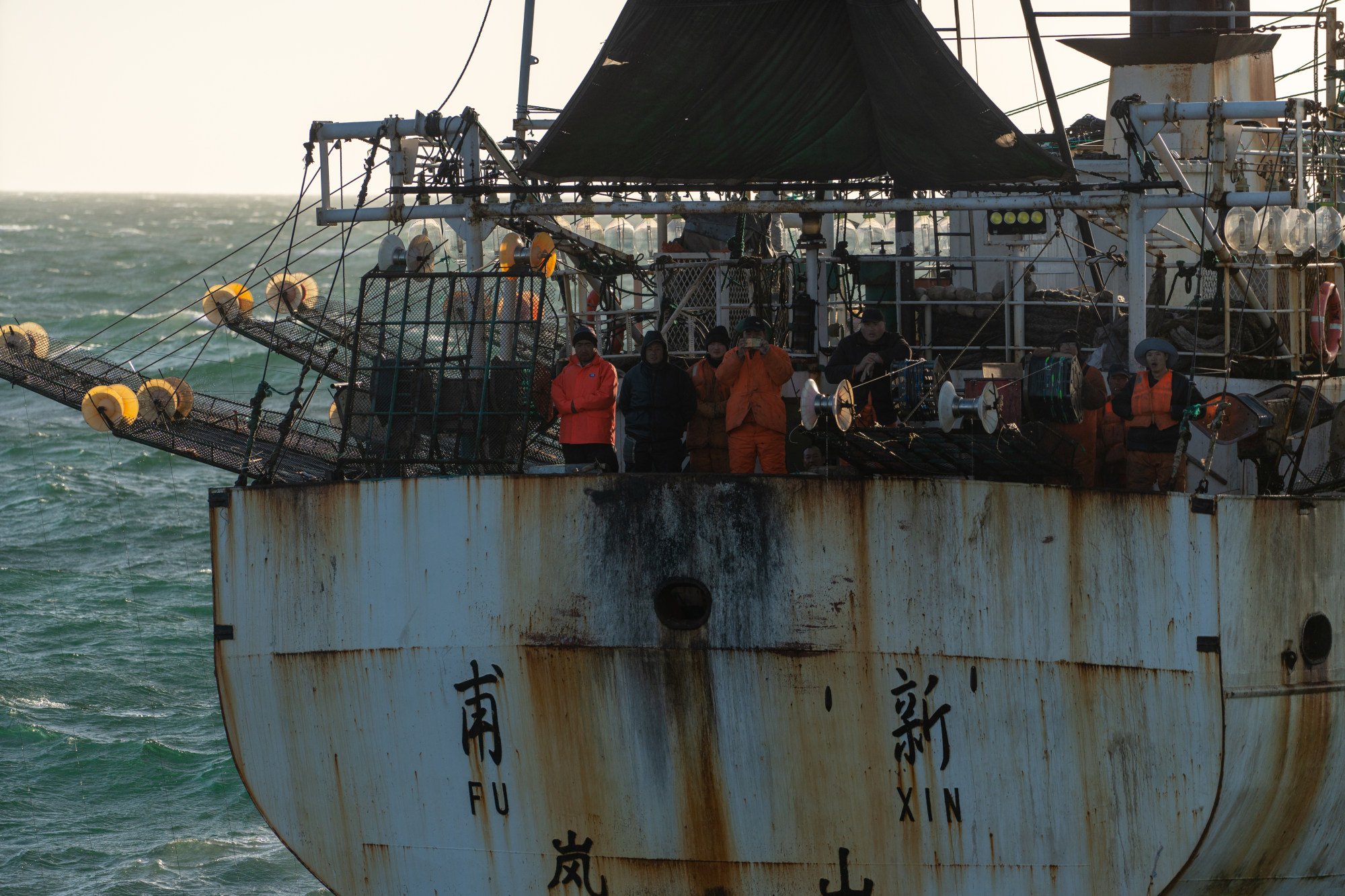
When the Environmental Justice Foundation interviewed 116 Indonesian crew members who had worked between September 2020 and August 2021 on Chinese distant-water vessels, about 97 per cent of them reported having experienced some form of debt bondage or confiscation of guaranteed money and documents, and 58 per cent reported having seen or experienced physical violence.
The fleet is also ranked as the largest purveyor of illegally caught fish in the world. A 2022 review of illegal fishing incidents that occurred between 1980 and 2019, commissioned by the European Parliament, found that nearly half of the cases where the vessel type was identified involved Chinese squid ships.
Compared with other countries, China has been not only less responsive to international regulations and media pressure when it comes to labour rights and ocean preservation, but also less transparent about its fishing boats and processing factories, says Sally Yozell, director of the Environmental Security programme at the Stimson Center, a research organisation in Washington.
Since a large proportion of fish consumed in the United States is caught or processed by China, she says it is especially difficult for companies to know whether the products they sell are tainted by illegal fishing or human rights abuses.
When this seafood reaches land, it often goes through processing plants in China. The Chinese government also bolsters its seafood industry with workers from North Korea, primarily in processing plants in the border province of Liaoning.
China is distinct because of the size of its fleet and because it uses the fleet for geopolitical ambitions
Ian Ralby, CEO of I.R. Consilium, a global consultancy focusing on maritime security
The North Korean government has, for the past 30 years, sent citizens to work in factories in Russia and China, and made them put 90 per cent of their earnings – amounting to hundreds of millions of dollars per year – into accounts controlled by the government.
As of November 2022, more than 80,000 North Koreans were employed in Chinese border cities, including hundreds in seafood plants. Videos from the Chinese social-media app Douyin show North Korean female workers in seafood factories in Dandong and Donggang as recently as November 2022.
The Zhen Fa 7 began its journey on August 29, 2019, when it left the port of Shidao, in China’s Shandong province, and sailed to the port of Busan, in South Korea, to pick up its Indonesian crew.
It was a festive time. The final week of August marks the start of the autumn fishing season in China and sees more than 20,000 ships put to sea each year.
Amid fireworks and drum-playing, villagers in Shidao hung red flags on fishing boats to celebrate hopes for a hearty haul. Three days after the Zhen Fa 7 launched, a headline in a provincial newspaper declared, “Open the sea! Let’s open our appetite and eat seafood.”
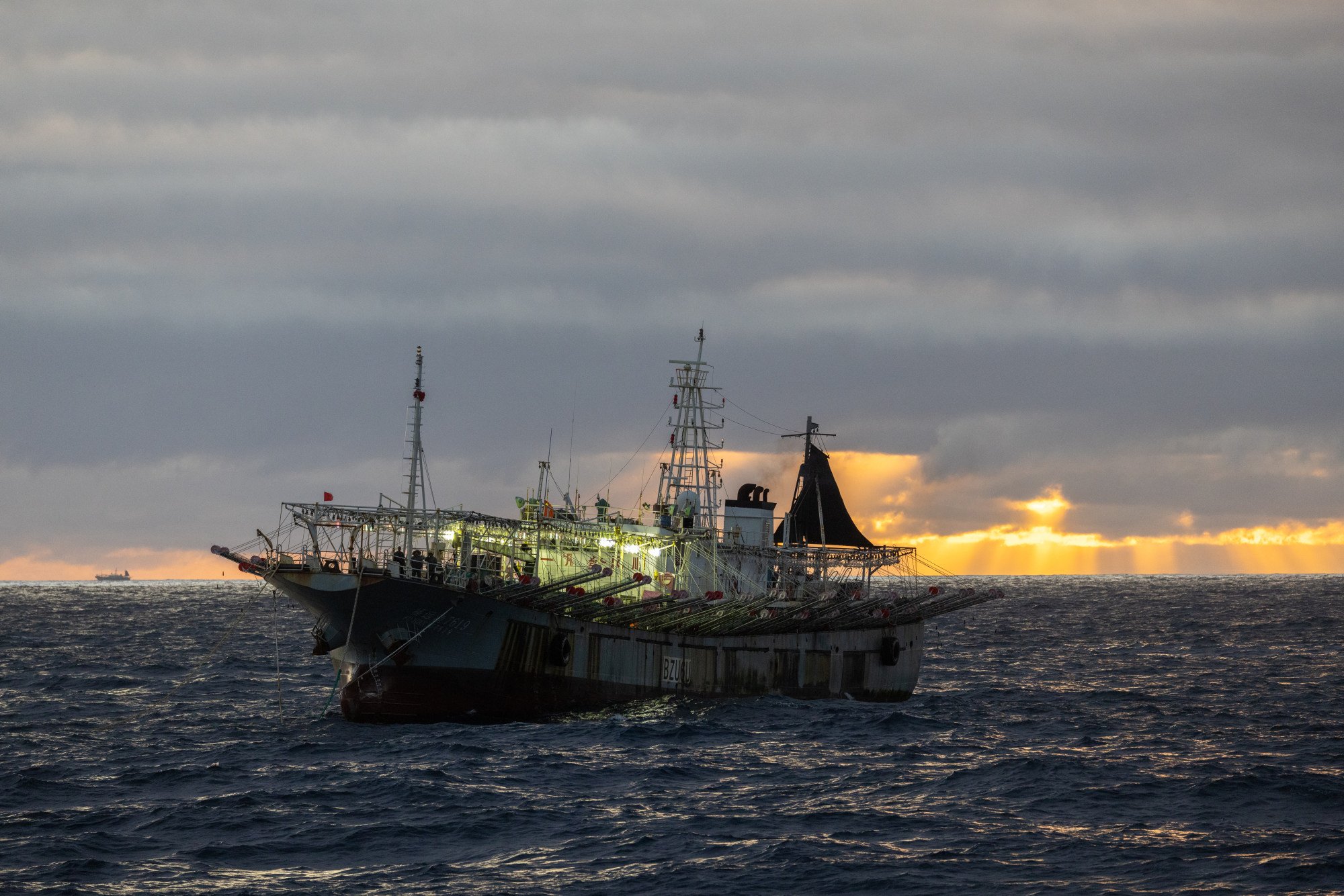
Aritonang, who lived in the coastal village of Batu Lungun, in Indonesia’s Bengkulu province, had worked hard to secure himself a position on board. After graduating from high school in 2018 he had struggled to find work. The rate of unemployment in Indonesia was high: more than 5.5 per cent nationally, and over 16 per cent for youth.
So when Anhar, a local friend, suggested that the two of them find work on a fishing boat, Aritonang agreed. Friends and family were surprised by his decision, given the demands of the job and the low pay. But a job was a job, and both he and Anhar desperately needed one. “On land, they ask for my skill,” says Anhar. “To be honest, I don’t have any.”
In the summer of 2019, Aritonang and Anhar contacted PT Bahtera Agung Samudra, a “manning” agency based in Central Java. In the maritime world, manning agencies recruit and supply workers to fishing vessels, handling everything from pay cheques, work contracts and plane tickets to port fees and processing visas.
They are poorly regulated, frequently abusive and have been linked to human trafficking. On July 5, 2019, following the agency’s instructions, Aritonang and Anhar took a boat to Java and then made their way to Tegal.
There, they underwent a medical examination and handed over their passports and bank documents, along with several headshots and copies of their birth certificates. (The agency does not have a licence to operate, according to government records, and did not respond to requests for comment.)
How Chinese keyboard apps could potentially expose everything you type
How Chinese keyboard apps could potentially expose everything you type
For the next two months, they waited in Tegal to hear if they had got the job. Money ran short. Through Facebook messenger, Aritonang wrote to his friend Firmandes Nugraha, asking for help to pay for food. Nugraha urged him to return home. “You don’t even know how to swim,” his friend reminded him.
Eventually, assignments came through, and, on September 1, Aritonang appeared in a Facebook photo with other Indonesians waiting in Busan to board their fishing vessels. “Just a bunch of not high-ranking people who want to be successful by having a bright future,” wrote Aritonang.
That day, Aritonang and Anhar boarded the Zhen Fa 7, and the ship set sail across the Pacific with a crew of 30 men: 20 from China, 10 from Indonesia.
For most of the 20th century, distant-water fishing was dominated by three countries: the Soviet Union, Japan and Spain. These fleets shrank in size after the Soviet collapse, and as labour and environmental standards made fishing more costly. But during this period, China invested billions of dollars in its fleet and took advantage of new technologies to muscle in on a very lucrative industry.
China has also attempted to fortify its autonomy by building its own processing plants, cold-storage facilities and fishing ports overseas.
‘If I cried, I’d be beaten more’: he works to stop kids feeling as he did
‘If I cried, I’d be beaten more’: he works to stop kids feeling as he did
These efforts succeeded beyond any expectations. In 1988, Chinese ships caught 90,000 tonnes of seafood, and in 2020, 2.32 billion tonnes. No other country comes close.
For China, its vast armada has great value that extends beyond just maintaining its status as a seafood superpower. It also helps the country create jobs, make money and feed its population. Abroad, the fleet helps the country forge new trade routes, flex political muscle, press territorial claims and increase China’s political influence in the developing world.
Political analysts, particularly in the West, say that having just one country controlling a global resource as valuable as seafood creates a precarious power imbalance. Navy analysts and ocean conservationists also fear that China is expanding its maritime reach in ways that are undermining global food security, eroding international law, and heightening military tensions.
“Plenty of countries are engaging in destructive fishing practices but China is distinct because of the size of its fleet and because it uses the fleet for geopolitical ambitions,” says Ian Ralby, CEO of I.R. Consilium, a global consultancy that focuses on maritime security.
“No one else has the same level of state ownership in this industry, no one else has a law that obliges their fishing ships to actively gather and hand over intelligence to the government and no one else is as actively invading other countries’ waters.”
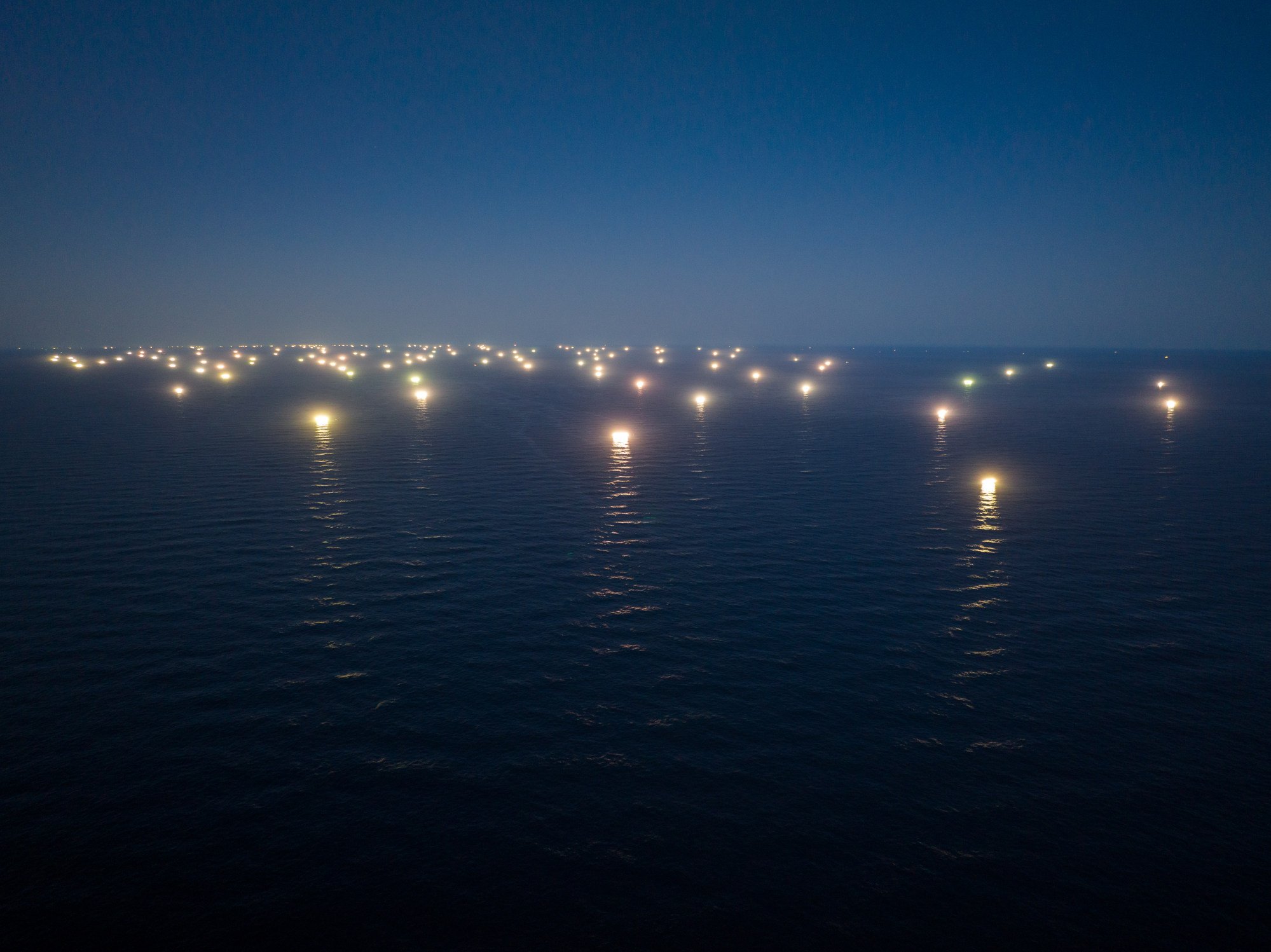
China’s dominance has come at a time when global hunger for the sea’s bounty has never been greater. Seafood is the world’s last major source of wild protein and an existentially important form of sustenance for much of the planet.
During the past 50 years, global seafood consumption has risen more than fivefold, and the industry, led by China, has satisfied that appetite through technological advances in refrigeration, engine efficiency, hull strength and radar. Satellite navigation has also revolutionised how long fishing vessels can stay at sea, and the distances they travel.
Industrial fishing has now advanced so much that it has become less an art than a science, more a harvest than a hunt. To compete requires knowledge and huge reserves of capital, which Japan and European countries have in recent decades been unable to provide. But China has had both, along with a fierce will to compete and win.
China has grown the size of its fleet predominantly through state subsidies, which by 2018 had reached US$7 billion annually, making it the world’s largest provider of fishing subsidies. The vast majority of that investment has gone towards expenses such as fuel and the cost of new boats.
Ocean researchers consider these subsidies harmful, because they expand the size or efficiency of fishing fleets, which further deplete already diminished fish stocks.
His dream came true. But for viral ‘tree man’, much worse was to come
His dream came true. But for viral ‘tree man’, much worse was to come
The Chinese government’s support of its fleet is vital. Enric Sala, the director of National Geographic’s Pristine Seas project, says that more than half of the fishing that occurs on the high seas globally would be unprofitable without these subsidies, and squid jigging is the least profitable of all types of high-seas fishing.
China also bolsters its fleet with logistical, security and intelligence support. For example, it sends vessels updates on the size and location of the world’s major squid colonies, allowing them to work in a coordinated manner.
In July 2022, a reporter observed an armada of about 260 Chinese squid ships jigging a patch of sea west of the Galapagos Islands. The group suddenly pulled up anchors, almost simultaneously, and moved 160km (100 miles) to the southeast. “This kind of coordination is atypical,” says Ted Schmitt, the director of Skylight, a maritime-monitoring programme.
“Fishing vessels from most other countries wouldn’t work together on this scale.”
During the past four years, a team of reporters has conducted a broad investigation of working conditions, human-rights abuses and environmental crimes in the world’s seafood supply chain. Because the Chinese distant-water fishing fleet is so large, so widely dispersed and so notoriously brutal, the investigation centred on this fleet.
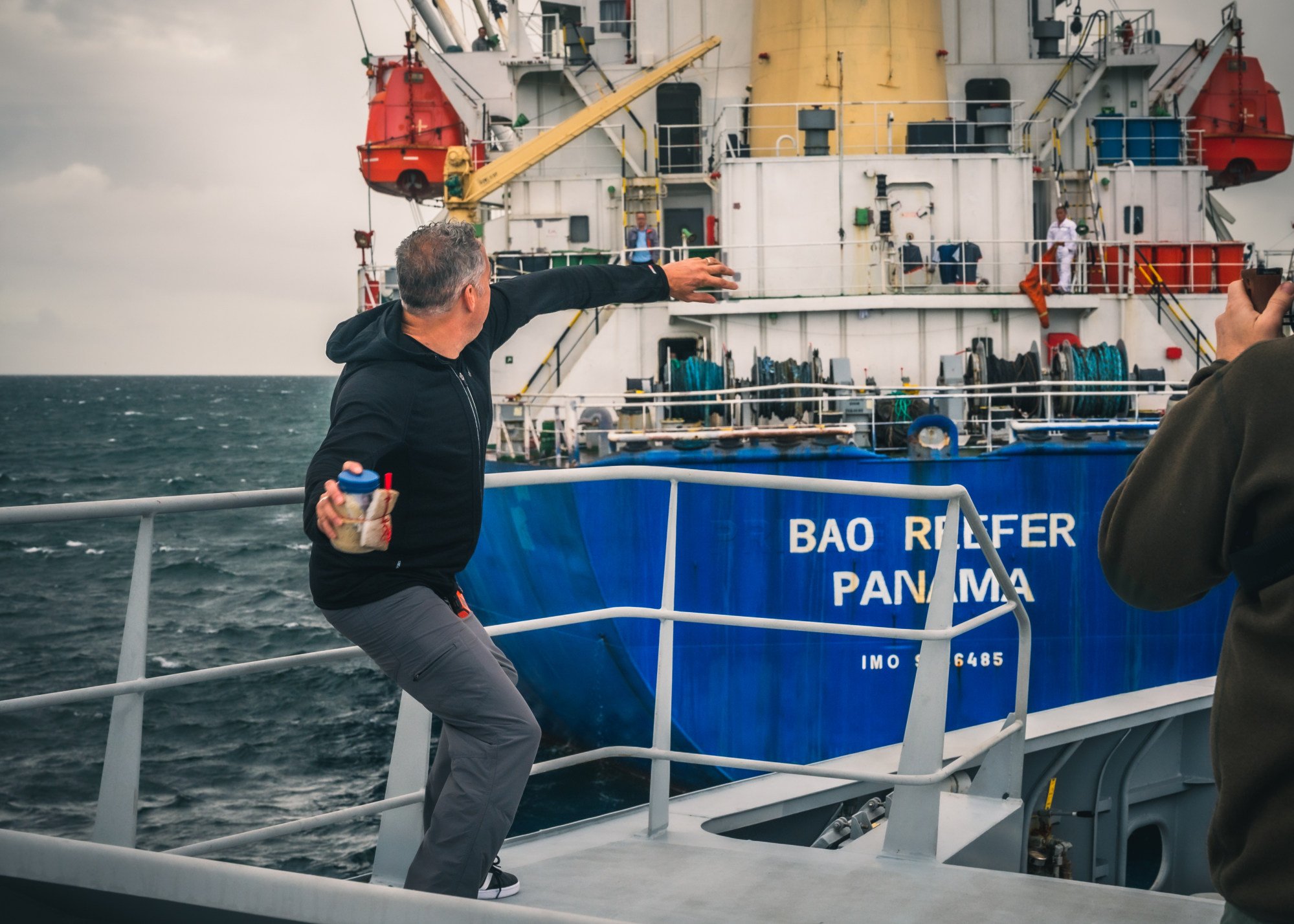
The reporters interviewed captains and boarded ships in the South Pacific Ocean, near the Galapagos Islands; in the South Atlantic Ocean, near the Falkland Islands; in the Atlantic Ocean, near Gambia; and in the Sea of Japan, near Korea.
The visits to these ships revealed in stark detail a broad pattern of human-rights and labour abuses, including debt bondage, wage withholding, excessive working hours, beatings of deckhands, passport confiscation, prohibiting timely access to medical care and deaths from violence.
Workdays on many Chinese open-water fishing vessels routinely last 15 hours, six days a week. Crew quarters are cramped. Injuries, malnutrition, illness and beatings are common.
One of these trips, facilitated in February 2022 by Sea Shepherd, an ocean-conservation group, included an invitation to board a Chinese squid-fishing ship near the Falklands. The captain of the vessel granted reporters permission to roam freely as long as they did not name his vessel.
Whenever squid ships are fishing, the heaviest labour takes place at night. The ships are festooned with hundreds of bowling-ball-sized light bulbs, which hang on racks on both sides of the vessel and are used to lure squid up from the depths.
Our passports were taken. They won’t give them back.
A deckhand on a Chinese fishing vessel
As squid are hauled in, the scene on deck often looks like a brightly lit auto-body shop where an oil change has gone terribly wrong. When pulled on board, squid squirt purplish black ink.
Warm and viscous, the ink coagulates within minutes and coats all surfaces with a slippery mucus-like ooze. Because deep-sea squid have high levels of ammonia in their tissue for buoyancy, the air on board smells powerfully like urine.
The mood on board felt like that of a watery purgatory. The ship had about 50 “jigs” hanging off each side, all operated by automatic reels. Crew members stationed around the deck were responsible for monitoring two or three reels at a time, to ensure they didn’t jam.
The men’s teeth were yellowed from chain smoking, their skin a sickly sallow, their hands torn and spongy from sharp gear and perpetual wetness.
Two Chinese deckhands wearing bright orange life vests stood on deck babysitting the automatic reels.
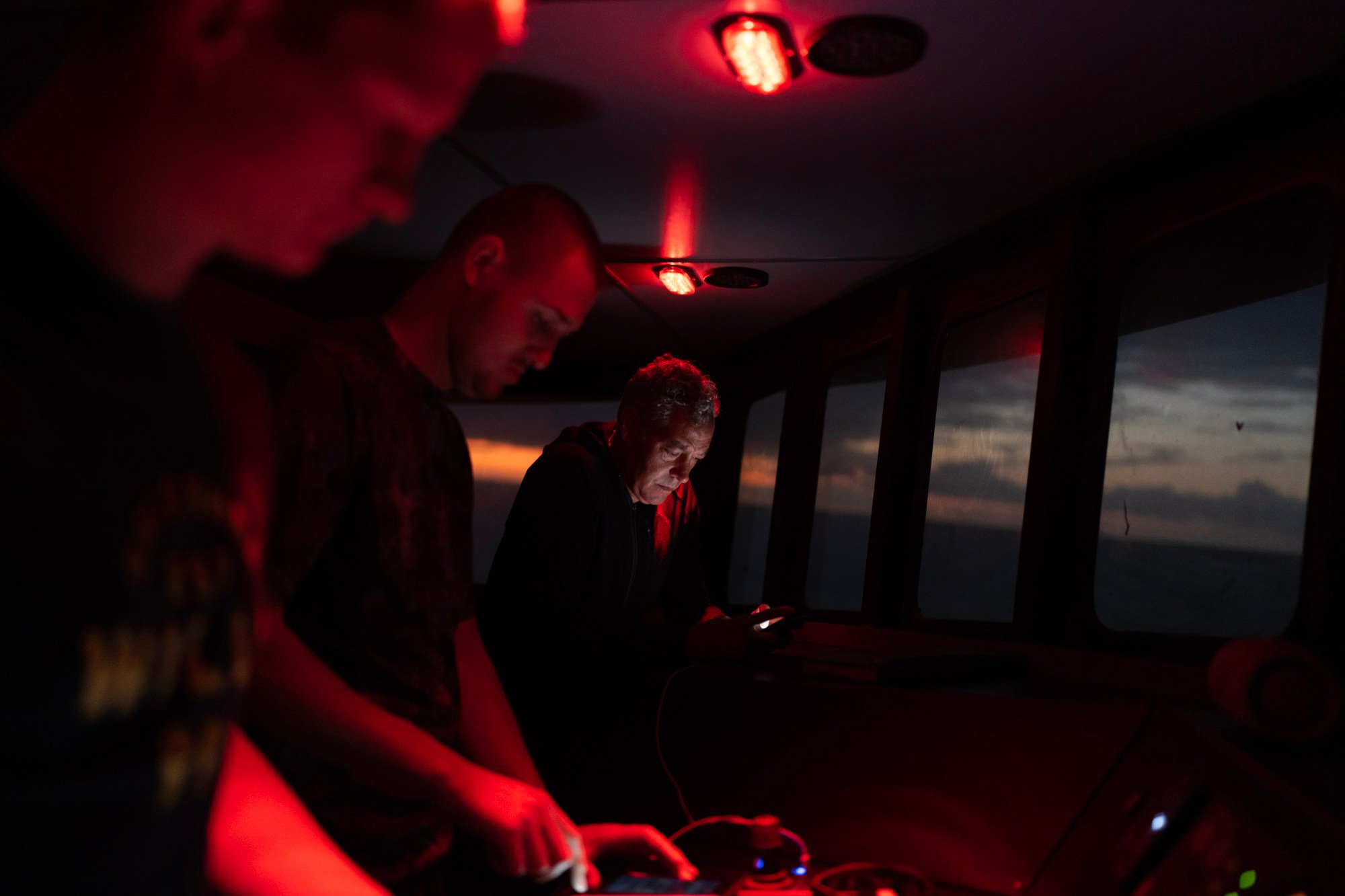
One man was 28, the other 18. It was their first time at sea, and both had signed two-year contracts. They earned about US$10,000 a year, but if they missed a day of work through sickness or injury, they were docked two days’ pay.
“Our passports were taken,” one deckhand told the visiting reporter. “They won’t give them back.”
Instead of speaking more, he began typing on his mobile phone, for fear of being overheard. “Can you take us to the embassy in Argentina? I can’t disclose too much right now given I still need to work on the vessel. If I give too much information it might potentially create issues on board. Please contact my family.”
Stories of deckhands held captive on these vessels continue to surface: more recently, in June 2023, a bottle washed ashore on a beach in Maldonado, Uruguay, with a message inside from a distressed deckhand on another Chinese squidder:
“Hello, I am a crew member of the ship Lu Qing Yuan Yu 765, and I was locked up by the company. When you see this paper, please help me call the police! SOS. SOS.” (The owner of the ship, Qingdao Songhai Fishery, says the claims were fabricated by crew members.)
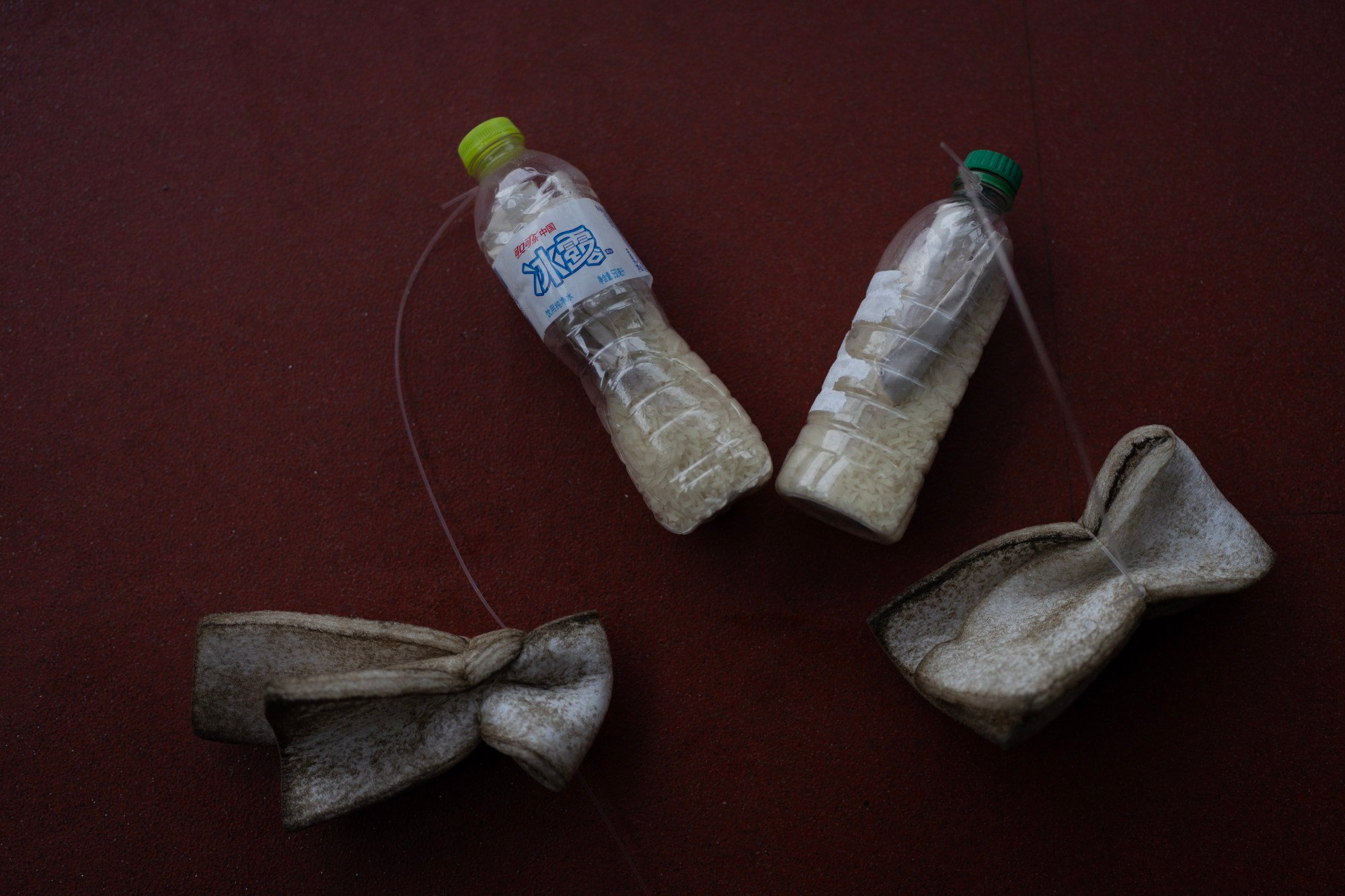
Aritonang fell severely ill in late January 2021. The whites of his eyes turned yellow, his legs and feet grew swollen and achy, and he lost his appetite and ability to walk. In all likelihood, he was suffering from a disease known as beriberi, caused by a deficiency of vitamin B1, also known as thiamine.
Sometimes called “rice disease”, beriberi has historically broken out on ships and in prisons, asylums and migrant camps – anywhere that diets have consisted mainly of polished or white rice or wheat flour, both of which are poor sources of thiamine.
When beriberi is found on ships, it is considered a possible indicator of criminal neglect because it is slow-acting, treatable and reversible, according to forensic pathologists.
The other Indonesians on board begged the captain to get Aritonang onshore medical attention, but the captain refused. Later, when asked to explain the captain’s refusal, Anhar, Aritonang’s friend and fellow crewmate, said, “There was still a lot of squid. We were in the middle of an operation.”
By February, Aritonang could no longer stand. He moaned in pain, slipping in and out of consciousness. Incensed, the Indonesian crew threatened to strike. “We were all against the captain,” Anhar recounted. The captain finally acquiesced on March 2 and had Aritonang transferred to a nearby fuel tanker called the Marlin, whose crew put him ashore in Montevideo six days later.
But by then it was too late. In the emergency room, doctors administered intravenous fluids. For the next several hours, they struggled to keep him alive while translator Reyes waited anxiously in the hallway. Eventually, they emerged from the emergency room to inform her that he had died.
A day later, the local coroner conducted an autopsy. “A situation of physical abuse emerged,” it reads.
Nicolas Potrie, who runs the Indonesian consulate in the city, recalls getting a call from Mirta Morales, the prosecutor who investigated Aritonang’s case, who told him, “We need to continue trying to figure out what happened. These marks – everybody saw them.” Morales declined to say whether the investigation was closed but added that, as with most crimes at sea, she had very little information to work with.
On April 22, Aritonang’s body was flown from Montevideo to Jakarta, then driven to his family home in the countryside, where a solemn crowd of villagers lined the road to pay their respects. The family opted not to open the coffin.
A funeral was held the next day, and Aritonang was buried a few feet from his father in a cemetery plot not far from his church, near the side of a road. His grave marker consisted of two slats of wood joined to make a cross.
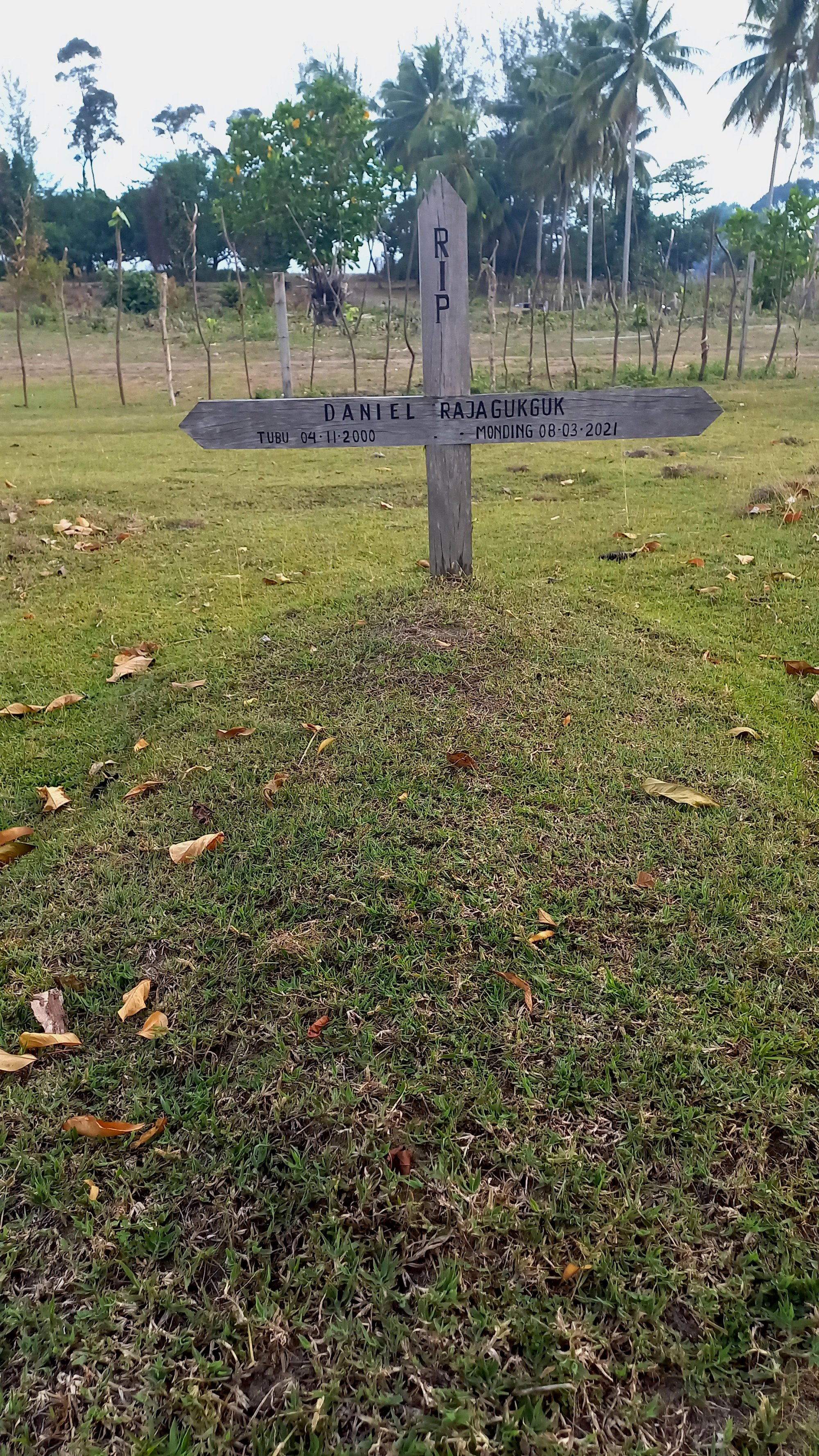
That night, an official from Aritonang’s manning agency visited the family at their home to discuss a “peace agreement”. Anhar says the family accepted a settlement of 200 million rupiah (US$12,775).
The family was reluctant to talk about the events on the ship. Aritonang’s brother Beben said that he didn’t want his family to get in trouble, and that talking about the case might cause problems for his mother. “We, Daniel’s family,” he said, “have made peace with the ship people and have let him go.”
More than 14,500km away, the Zhen Fa 7 soon began its long journey home. That May, it reached Singapore, where it disembarked its remaining Indonesian crew, who had not set foot on land for nearly two years. The ship then, at last, returned to Shandong, where it unloaded 330 tonnes of squid, marked in port records as destined for export.
In an email, the Zhen Fa 7’s owner, Rongcheng Wangdao Deep-Sea Aquatic Products, declined to comment on Aritonang’s death but said it had found no evidence of complaints from the crew about their living or working conditions on the vessel.
The company added that it had handed the matter over to the China Overseas Fisheries Association, which regulates the industry. Questions submitted to that agency went unanswered.
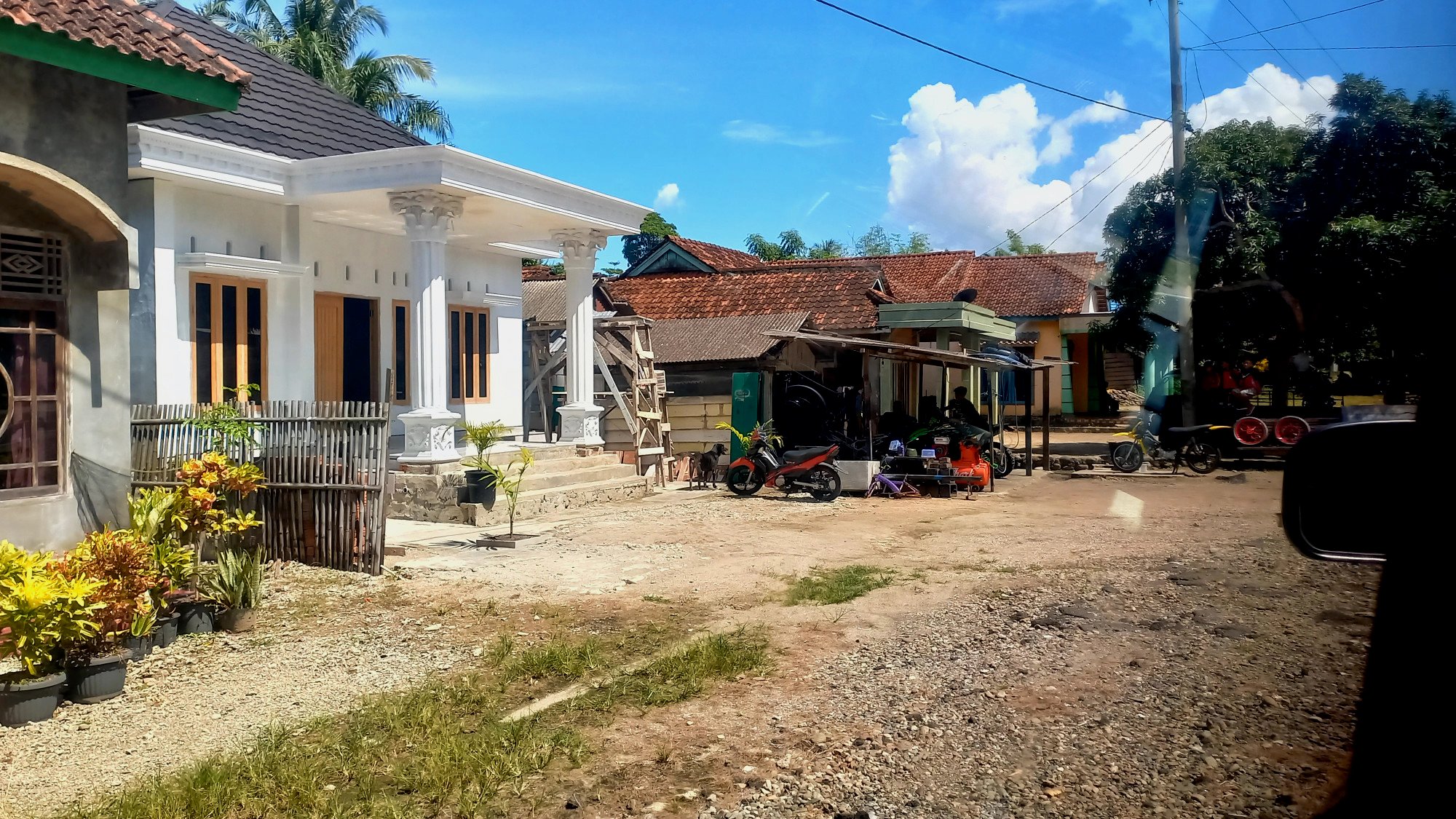
On April 10, 2022, a year after Aritonang’s death, his mother, Sihombing, sat on a leopard-print rug in her living room with Leonardo, another son. Sihombing apologised that the family had no furniture, and no place other than the floor to sit.
The house underwent repairs, using money from the settlement, according to the village chief; in the end, Aritonang had managed to fix up his parents’ house after all. Asked about Daniel, Sihombing began to weep: “You can see how I am now.”
“Don’t be sad,” Leonardo said, patiently trying to console his mother. “It was his time.”
This story was produced by The Outlaw Ocean Project, a non-profit journalism organisation in Washington. Reporting and writing was contributed by Joe Galvin, Maya Martin, Susan Ryan, Daniel Murphy and Austin Brush.
Stay connected with us on social media platform for instant update click here to join our Twitter, & Facebook
We are now on Telegram. Click here to join our channel (@TechiUpdate) and stay updated with the latest Technology headlines.
For all the latest Food and Drinks News Click Here
